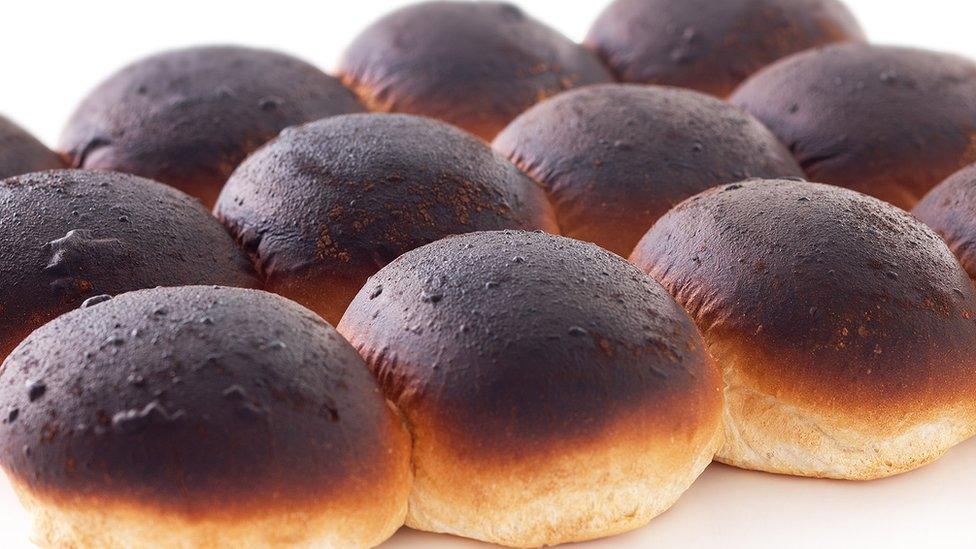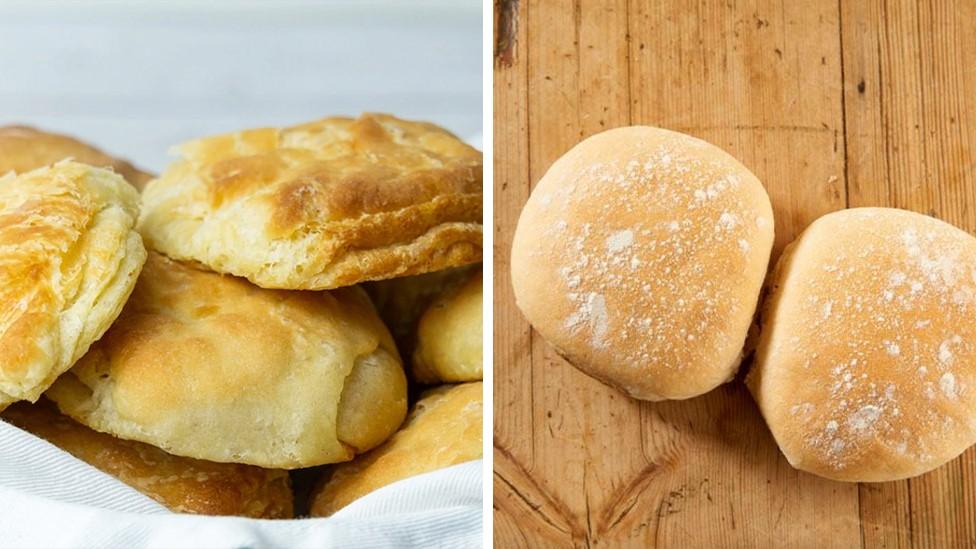How the Scottish morning roll became a national treasure
- Published
"There's nothing more satisfying" - Baker Andrew Chisholm on making the 'perfect' Scottish morning roll
The sudden collapse earlier this month of Glasgow baking giant Morton's Rolls sent shockwaves across communities in the west of Scotland.
Consumers were faced with the loss of Morton's traditional crispy roll, a breakfast staple which had been sold in its millions every week for decades.
An online petition, external calling for Morton's Rolls to be saved attracted hundreds of signatures within days.
One petitioner described the rolls as "part of the identity of Scotland", while another called them "a national treasure".
The fate of Morton's was even raised in the Scottish Parliament, with First Minister Nicola Sturgeon describing it as an "iconic Scottish brand" as she vowed to do everything possible to help reduce the impact of hundreds of job losses.
However the firm is due to restart production on Sunday, after the firm was bought out of administration by a consortium of investors.
So how did the humble morning roll draw such a reaction?
Scottish food researcher Peter Gilchrist argues that they are as vital to working-class food culture in the west of Scotland as a roast chicken dinner is to the English middle classes.
He puts their popularity in part down to a sense of nostalgia.
"Growing up in the 90s in a council flat in Paisley, Saturday morning was all about breakfast," he explains.
"My dad would head out early to queue for a dozen crispy rolls from the baker and pop next door to the butcher for bacon and square sausage. We would eat them with tomato sauce, butter and tea."

Peter Gilchrist thinks nostalgia in part explains the Scottish morning roll's popularity
Peter, who is a food tourism ambassador for Scotland Food and Drink, adds: "There's a good chance that if your grandparents ate a floury bap with bacon and black pudding, that food tradition has been passed down to your parents and then to you.
"It is in variety we find a sort of identity as a family; our morning roll order is part of our working-class story."
The loss of Morton's Rolls forced Glasgow corner shops, newsagents, chippies and restaurants to scramble for alternatives from rival producers such as McGhees, which already sells more than three million rolls a week.
Scott Marwaha, who owns the Mayfield convenience store in Ruchill, says many of his regulars won't go for anything other than "a Morton's" because they've grown up with the taste.

Scott Marwaha says some customers went to great lengths to get hold of a Morton's roll
Some, he explains, went to extraordinary lengths to get hold of the roll.
"One customer regularly bought five or six dozen at a time to take over to his family in Ireland," he said.
"There's also a lady from Dumfries who would call me to ask if I could put some rolls aside when she came to visit her mother."
But Morton's is only part of the story.
The reality is that for many Scots across the nation, breakfast or lunch just wouldn't be the same without a morning roll, whether it is soft, well-fired (black crust) or crispy.

Some prefer well-fired rolls, which have a black crust
Third-generation baker Andrew Chisholm thinks one reason for its popularity is its versatility.
Andrew, who owns Lanarkshire-based chain Christie the Baker, explains: "The great thing about a morning roll is that you can put anything in it, sweet or savoury.
"A lot of people will stack it and will have black pudding, beans, bacon or whatever they want in it.
"We even sell rolls filled with a Scotch pie. It's popular.
"My own favourite is a nice bit of Scottish cheddar and strawberry jam. Epic."
Andrew also points out that Scots have quite different tastes, according to where they live.
"The roll we make in North Lanarkshire is typical of what you find in the west of Scotland but if you go east to Edinburgh, you'll probably find it's a bit sweeter and a bit softer - there's a wee bit more fat in it.
"As you go north into Dundee, you'll probably find a lot more flour on it. Again it will be a bit sweeter, with more fat.
"If you go all the way up to Aberdeen and the surrounding area, it splits into two products.
"There's the softie, which they just call a morning roll - and the rowie or buttery, as it would be known locally. It is akin more to somewhere between a Danish pastry and a croissant, but made in a Scottish style."

Butteries (left) and "softies" are popular in the north east of Scotland
Despite recent events at Morton's, there is no sign of the Scots losing their appetite for the morning roll.
Scottish Scran, external, a website that celebrates Scottish food, claims it receives more requests for morning roll recipes than any other type of food.
Sonja Bolger, who runs the site with husband Phil, says: "A lot of people in our Facebook group have either moved away or don't live near a bakery that sells morning rolls, so they want to be able to make them."
Baker Andrew perhaps epitomises the passion that many north of the border feel for the Scottish roll.
"To be doing this job every day and seeing the morning rolls coming out of the oven perfectly shaped, how you want them - thin crust on top, a nice aroma coming from them, and the flour to be perfectly distributed on top every day - there is nothing more satisfying," he says.
- Published14 March 2023

- Published7 March 2023
